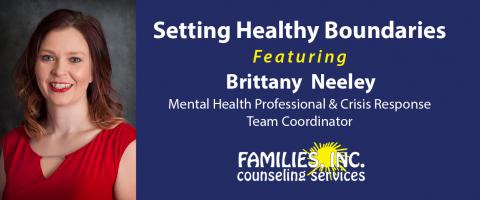
Most people instinctively protect their belongings. We lock our doors and construct fences around our property. While these physical boundaries are important, many people forget something equally meaningful.
Personal boundaries.
There are two types of personal boundaries: internal and external. Internal boundaries are the ones we set with ourselves. It’s how we manage our time, thoughts, and emotions. External boundaries are those centered around our relationships with other people. It is the ways we interact with others and how we allow people to treat us. Improving our ability to set boundaries is a way that we show care and concern for ourselves. It is incredibly important to mental health.
Poor boundaries can result in low self-esteem, significant distress in interpersonal relationships, anxiety, depression, and codependency. It leaves us feeling stressed, taken advantage of, and drained. These feelings can be improved through effectively setting boundaries with others and with ourselves.
So how do we set boundaries? Where do we start?
Start small. Learning to say “no” can be one of the best ways to begin setting boundaries. We don’t owe our time and energy to others, especially if it leaves us in a negative mindset. If saying “no” sounds too harsh at first, you might suggest an alternative solution such as recommending someone else for the task.
Clearly communicate needs. Many times, we know what we want or need but we are too afraid to ask for it. If we don’t communicate our needs, we can’t expect them to be met. How we say things can greatly impact how others receive it. Using “I statements” can be an effective way to begin practicing clear communication.
I feel ___ when ___ because ___.
Using these statements will help communicate our needs to others without making them feel attacked. For example: I feel disrespected when you take my things without asking because I value my personal space.
Be consistent. Although setting boundaries is hard and can feel mean when first implementing them, it is important to stick with it. Much like putting a toddler into time out, boundaries will only be respected if they are maintained. Doing this increases self-esteem and improves independence. The boundaries shouldn’t be so rigid that there isn’t room to grow but they should be consistent enough for people to understand what’s expected of them.
Respect the boundaries of others. We should treat others the way we want to be treated. It’s more than a good moral to go by. It truly gets the results we want. We cannot expect others to respect our boundaries if we are constantly imposing on theirs. This includes our children. Although we are the ones that are guiding them and keeping them safe, it’s important to respect their boundaries too. It models the behaviors and expectations we want them to have as they grow.
Don’t apologize. Change is hard for people and that includes a change in limits within relationships. We may feel guilt or others may react negatively to the new standards we set. It’s important to remember we can’t control the responses of others and we do have a right to ask for what we need, even if it upsets people at first.
Internal boundaries can be just as difficult. This is where we must evaluate our emotions and sort through things in a way that protects us (and others) from ourselves. We may have problems with internal boundaries and not even realize it. These can manifest as anxiety, problems responding well to feedback or criticism, or lashing out at others when you feel strong emotions.
To improve internal boundaries, we can:
● Find an outlet for strong feelings.
● Figure out where limits need to be set.
● Change negative self-talk to positive.
● Utilize problem-solving skills to decrease anxiety about things that happened in the past.
For example: We may leave a conversation with a friend feeling worried about something we said. Maybe we fear we were not empathetic enough to their problem. Rather than dwelling on it or even calling to apologize, we can plan to check in on our friend at a later date and explore what they need to talk about at that time.
Reminding ourselves it’s okay to feel guilt, shame, or even anger can be powerful. We have those feelings for a reason. It’s what we do with them that can create problems in our lives. Rather than leaving those feelings unresolved, we should set better limits with others to feel safe in our relationships or we may need to see where we could be violating their boundaries.
Although it can be a difficult task, the results of setting healthy boundaries with others are worth the emotional work it takes to put them in place. Understand that it will take time for the people we love to fully understand and respect the new way of interacting. But, in the end, it will strengthen our relationships and empower us to take more responsibility for our own happiness.


